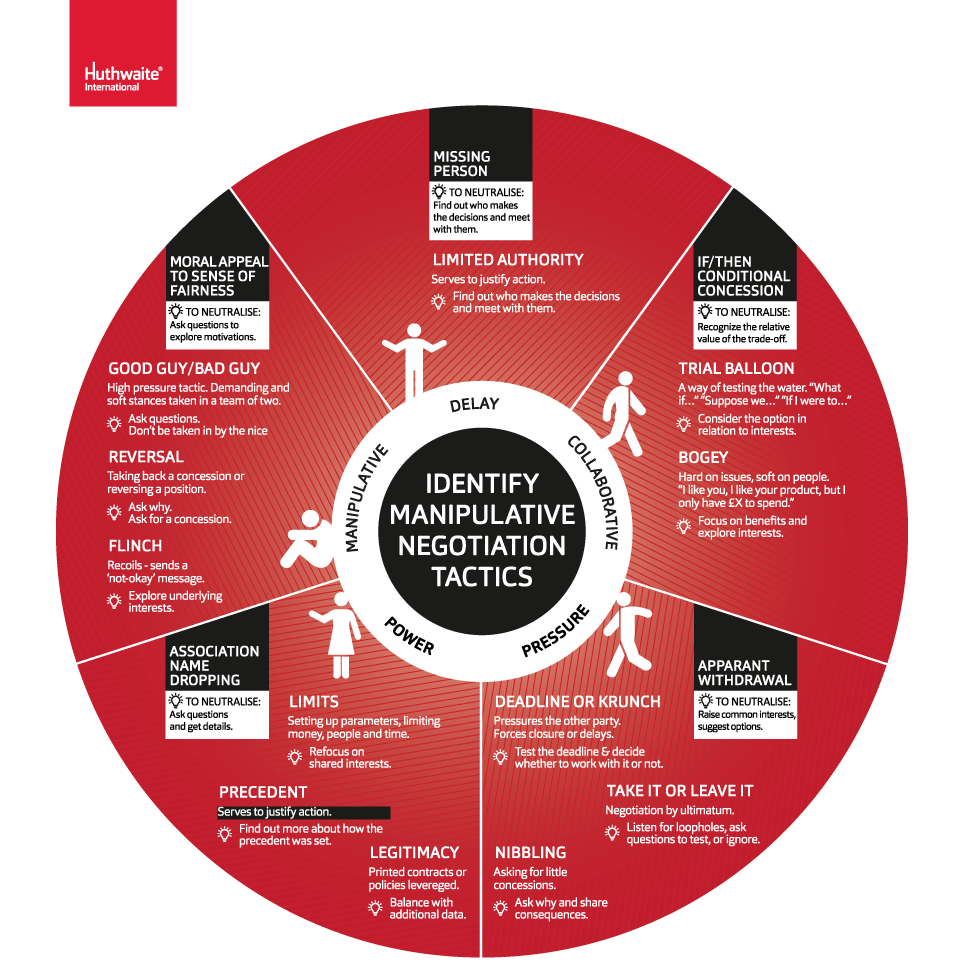It's not uncommon to encounter dirty tricks in negotiation. Even the most conservative and credible opponents can deploy a trick or two to help them win.
Some tricks are more obvious or conscious than others but regardless of size or intent, an unethical manoeuvre in a negotiation is never a good thing and can have a negative long-term impact on your trading relationship.
Huthwaite's research shows that the most successful negotiators don't entertain dirty tricks in negotiation but instead strive to reach agreements that are satisfactory to both parties, a perspective mirrored by Harvard Law School.
When both sides are happy they’re far more inclined to work towards a successful implementation, which at the end of the day, is the ultimate definition of a successful negotiation.
So, if you find yourself on the receiving end of something that doesn't feel quite right, what should you do?
It's rarely the case that you should walk away. Indeed, in most instances, provided you recognise what's happening, you can address the situation and swiftly bring it back to a better place.
This blog contains the most common dirty tricks in negotiation used together with countermeasures that’ll help you turn tricky scenarios into long-term profitable relationships.
Dirty tricks used in negotiation tactics [plus countermeasures]

1. Jet lag
The first of the dirty tricks in negotiation is to start meetings with people who’ve travelled long distances, while the negotiator's concentration is impeded due to jet lag or fatigue.
A variation on the theme is to 'entertain' the newly arrived traveller, ensuring there’s even less chance to catch up on much-needed rest before negotiations begin. It’s particularly difficult to refuse hospitality.
Research by airlines and medical schools indicates that jet lag seriously impairs judgement. However, as outlined by Harvard Business Review, jet lag needn’t wreck your business trip.
Moreover, leading airlines recommend travellers allow a quarter of a day for each hour of a time zone change to recuperate from the effects of jet lag. More information can be found in 'The Flyer's Handbook' (Pan Books).
Countermeasure #1
For negotiators working nationally, watch out for people who want to negotiate on their own territory early in the morning. Early morning starts and several hours of driving can also impair performance.
Travel early and leave time for recuperation before meeting the other party. Use the extra time wisely to double-check the negotiation planning - an area which is frequently neglected. Where you suspect your hosts like to be hospitable, keep news of your early arrival quiet. This can help to ensure you’re not 'entertained' until you are fully prepared for it.
2. “It's different over here"
This dirty trick is often used against people visiting other cultures.
Cultural differences can have a detrimental impact on a person’s ability to demonstrate negotiation skill. Some tricksters deliberately use and emphasise differences and local customs to gain changes or win points in particular clauses in the contract.
The approach of "but we always do it this way over here" can be difficult to counter if you're not prepared for it.
Countermeasure #2
If that isn't possible don't readily accept their argument as valid. Carefully and tenaciously seek further explanation and clarification. If it’s still not resolved, leave the clause open without agreement until you can subsequently check it out.
Our research shows that unsound propositions of this nature can be defeated by skilled questioning, which leads the trickster into more and more spurious statements which dilute the argument, destroy its credibility, and thus defeat it.
If you suspect this approach in advance, have with you a local expert who knows the customs. When negotiating in the USA for example, many organisations have found to their cost that it's a false economy not to engage a competent American lawyer to act on their behalf. The best local expert in the USA may well be a lawyer.
3. The application of standard terms and conditions
This is actually a variation of trick two.
Negotiators are often presented with contracts containing standard terms and conditions which are very much biased in favour of the other party. When questioned about these conditions the reply is usually "We always include these in our contracts, they're our standard terms and conditions of doing business".
The implication is that the terms can't be changed, particularly if they've been drawn up by the legal department.
Countermeasure #3
Although the terms and conditions are pre-printed as standard, it doesn't mean they can't be changed or that you can't challenge the content. Refuse to accept clauses that aren't in your interests. Remember, you have power in the negotiation as the other party wants to do business with you.
4. Rolling concessions
This dirty trick is frequently used to gain additional concessions from the unwary when the agreement appears to be in sight.
Giveaway phrases to look out for: “I think we’ve nearly got a deal, if we can just agree on this last item I think we’re there…”
It’s tempting to make concessions on this ‘final’ item to gain agreement. But having gained this concession the other party then says: “I feel much happier now, there’s just one small thing we need to sort out, and then I think we have a deal…”
They ask for another concession and so on. Each concession appears to be the last and the unwary negotiator may make several before realising how much has been given away.
Countermeasure #4
Huthwaite’s research shows that more concessions are made in the final stages of negotiations than in the whole of the main discussion.
Draw up an agenda of all the issues to be discussed early in the negotiation, so that additional ones can’t be introduced at a later stage.
When faced with ‘final demands’, carefully check there is nothing else to come before considering whether to agree. Remember, once you’ve got their issues and demands, don’t concede. Trade.
5. Delays and deadlines
This is an attempt to gain concessions using time pressure.
In its simplest form, the trick involves setting a deadline by which time the agreement must be signed, or the deal is off. It is often sprung on the other party. A slightly more sophisticated approach is to use delaying tactics during discussions to cause pressure later.
This ploy is often used where the other party has travel arrangements or another deadline. Again, it puts pressure on the other party to make concessions and obtain an agreement before the deadline.
Countermeasure #5
Keep arrangements flexible and build time around your negotiation. Time pressure may even work in your favour if you keep arrangements to yourself until the deadline has arrived. People who have been expecting you to depart may be disconcerted by your sudden willingness to stay and continue discussions.
6. Memos of agreement - plus
A rather unsubtle trick.
The manipulator offers to summarize the agreement reached at the meeting and then either changes or extends the agreement in their favour. This is often spotted by the other party but can cause acrimony or embarrassment in correcting it later.
Countermeasure #6
It's always worth collating the summary of an agreement while both parties are present. Huthwaite research shows skilled negotiators check that agreements are clearly understood by both parties.
7. Sunk cost tactics
This is based on the assumption that the more a negotiator has invested in trying to reach an agreement, the less willing they will be to abandon the negotiation.
For example, a negotiator faced with an unreasonable demand only ten minutes into a negotiation is likely to reject it, even if it could potentially jeopardise the entire negotiation.
On the other hand, if the negotiation has been going on for several months and progress towards an agreement has been made, it's much less likely that the negotiator will jeopardise the success of the discussions by rejecting demands.
Countermeasure #7
Write off the previous investment. It then has no significant influence on current decisions. Remember that the other party has an equal investment in the negotiation. Are they prepared to write off all they've invested by pressing for an unreasonable concession?
8. Hot and cold
The impact of emotions in negotiation shouldn’t be underestimated; in many cases, the perpetrator attempts to instil panic into the negotiator by changing from a position of enthusiasm with the negotiation to suddenly showing no reaction.
Our research shows that this low-reacting behaviour,, can result in a feeling that the perpetrator is disinterested or unimpressed.
It often results in the negotiator, in an attempt to rekindle interest, imparting copious amounts of information and offering concessions to get the negotiation back on track. This reaction is detrimental to the negotiator as it strengthens the perpetrator’s position.
Countermeasure #8
To counter their silence, remain calm. To avoid giving anything away, ask questions about their position. This way you gain information and in doing so, take back power.
9. The offer you must refuse
This tactic tries to exploit the natural sense of fair play that many people possess and the feeling of guilt that arises if people feel they’re seen as unreasonable.
The perpetrator makes a great show of the importance and needs for acceptance of a particular point, knowing full well there’s no way in which the other party can accept it.
By refusing on this important issue, the other party feels some measure of guilt and feels obliged to make concessions on the next point raised as a show of good faith.
Countermeasure #9
Negotiate each issue without regard to the one that has gone before. Each issue must be treated as if it is the only issue under negotiation and not subject to residual influence from previous discussions.
10. Deliberate confusion
This tactic is sometimes used when the other negotiator is losing ground.
Creating a smoke screen can help to cover up a weak case if it's being exposed by the other side.
Countermeasure #10
Skilled negotiators deal with this by:
- checking their understanding with the other side to ensure both parties have the same view
- summarising to confirm agreement on what has been discussed.
- This requires patience and listening skills but is a very effective way of refocusing on the real issues.
11. “I haven't the authority…”
This tactic implies a lack of decision-making authority.
The negotiator is quite happy to accept concessions made by the other party but qualifies any concessions asked for by saying, “I'll have to check this out with my boss, as this demand exceeds my mandate”.
Countermeasure #11
At the outset, check the other party has the authority to make a deal. If not, either match your authority to theirs (state that you will also have to check out concessions with your boss) or suggest that you negotiate with the person in the organisation who does have the authority to sign an agreement.
12. “We need to rubber stamp this”
This is a variation on trick 10.
Some multinational companies working with a degree of local autonomy, negotiate regionally and claim to have authority to make an agreement.
After some hard bargaining, when an agreement is eventually reached, they announce that terms need approval by Head Office (usually referred to as the need to be ‘rubber stamped’). Head Office then raises issues it would like to clarify or renegotiate. What follows is a new negotiation but one which starts, of course, from the point where the first one concluded.
Countermeasure #12
Either insist the original agreement is honoured or insist the new negotiation starts from square one.
13. Changing negotiators
This tactic is sometimes used when the negotiation isn’t going the way the other party would like.
By removing the original negotiator and bringing in a new face they hope to regain the initiative. The new negotiator often denies knowledge of concessions their company has made or claims the previous negotiator had no mandate to make them. At the same time, you’re held to the concessions you have made.
Countermeasure #13
Counter this by either insisting that previous agreements are honoured or by starting negotiations again from scratch. In some circumstances, it may be in your interests to also change negotiators.
14. “I can’t divulge the details”
This is one of the most commonly used dirty tricks in negotiation.
People using this tactic often appear reluctant to release details of a so-called competitor offer or other issue on ethical grounds. Its purpose is to make you feel you've misjudged the market or your relative strength and so give a concession, which makes you competitive again.
Countermeasure #14
Even though the other party will probably refuse to release details such as the competitor's name, you shouldn't believe what they say about cost, you can check the credibility of the competitive offer by asking for details such as: 'What sort of operator training are they offering?' or 'What response time do they guarantee?'
Alternatively, you can try: 'I'll need a strong case to persuade my boss to do better - can you help me with more details?'
The key thing is to gather information to check: Is it a real competitor? If it is, are we comparing like with like?
If you're not comparing like with like you've got two main options: Reformulate your offer to show how you can meet the price with a lower specification or, help the other party to realise the costs or disadvantages of a weaker solution.








